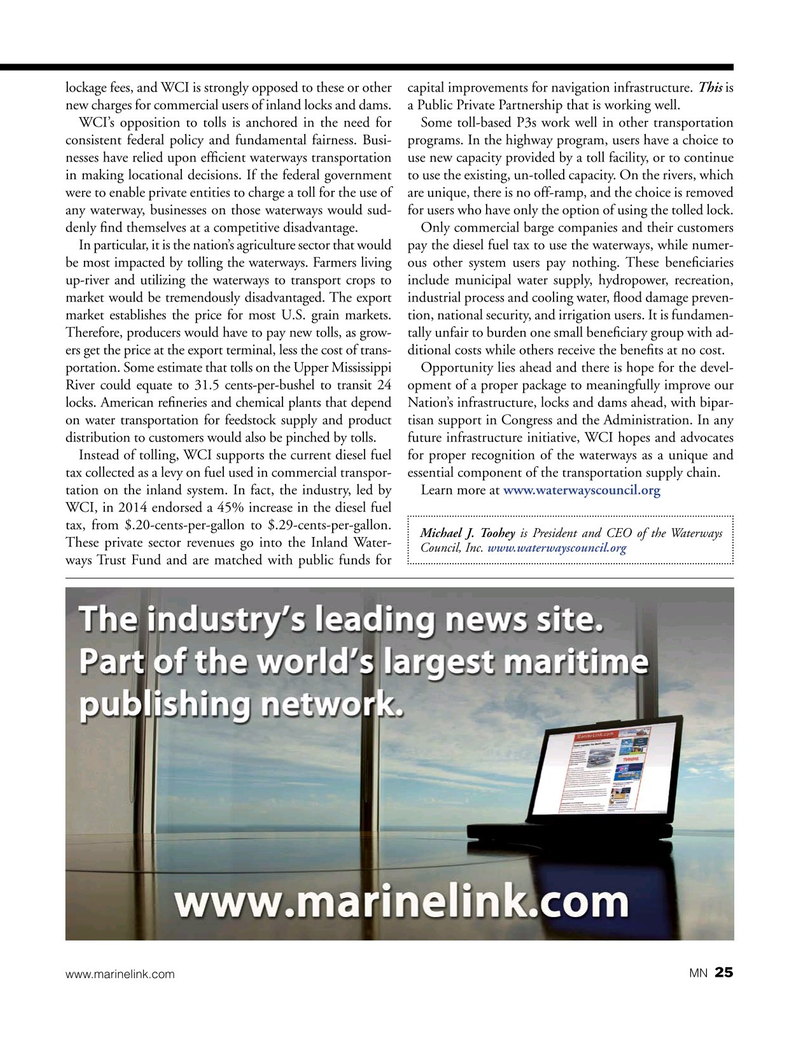
Page 25: of Marine News Magazine (February 2019)
Dredging & Marine Construction
Read this page in Pdf, Flash or Html5 edition of February 2019 Marine News Magazine
lockage fees, and WCI is strongly opposed to these or other capital improvements for navigation infrastructure. This is new charges for commercial users of inland locks and dams. a Public Private Partnership that is working well.
WCI’s opposition to tolls is anchored in the need for Some toll-based P3s work well in other transportation consistent federal policy and fundamental fairness. Busi- programs. In the highway program, users have a choice to nesses have relied upon effcient waterways transportation use new capacity provided by a toll facility, or to continue in making locational decisions. If the federal government to use the existing, un-tolled capacity. On the rivers, which were to enable private entities to charge a toll for the use of are unique, there is no off-ramp, and the choice is removed any waterway, businesses on those waterways would sud- for users who have only the option of using the tolled lock.
denly fnd themselves at a competitive disadvantage. Only commercial barge companies and their customers
In particular, it is the nation’s agriculture sector that would pay the diesel fuel tax to use the waterways, while numer- be most impacted by tolling the waterways. Farmers living ous other system users pay nothing. These benefciaries up-river and utilizing the waterways to transport crops to include municipal water supply, hydropower, recreation, market would be tremendously disadvantaged. The export industrial process and cooling water, food damage preven- market establishes the price for most U.S. grain markets. tion, national security, and irrigation users. It is fundamen-
Therefore, producers would have to pay new tolls, as grow- tally unfair to burden one small benefciary group with ad- ers get the price at the export terminal, less the cost of trans- ditional costs while others receive the benefts at no cost. portation. Some estimate that tolls on the Upper Mississippi Opportunity lies ahead and there is hope for the devel-
River could equate to 31.5 cents-per-bushel to transit 24 opment of a proper package to meaningfully improve our locks. American refneries and chemical plants that depend Nation’s infrastructure, locks and dams ahead, with bipar- on water transportation for feedstock supply and product tisan support in Congress and the Administration. In any distribution to customers would also be pinched by tolls. future infrastructure initiative, WCI hopes and advocates
Instead of tolling, WCI supports the current diesel fuel for proper recognition of the waterways as a unique and tax collected as a levy on fuel used in commercial transpor- essential component of the transportation supply chain. tation on the inland system. In fact, the industry, led by Learn more at www.waterwayscouncil.org
WCI, in 2014 endorsed a 45% increase in the diesel fuel tax, from $.20-cents-per-gallon to $.29-cents-per-gallon.
Michael J. Toohey is President and CEO of the Waterways
These private sector revenues go into the Inland Water-
Council, Inc. www.waterwayscouncil.org ways Trust Fund and are matched with public funds for 25 www.marinelink.com MN

 24
24

 26
26
